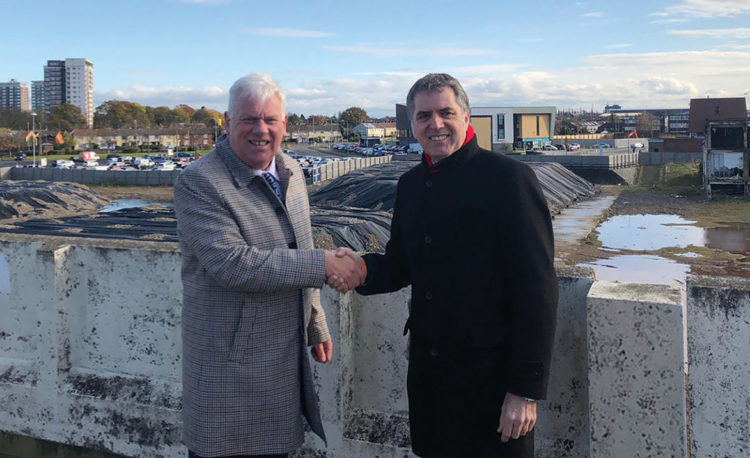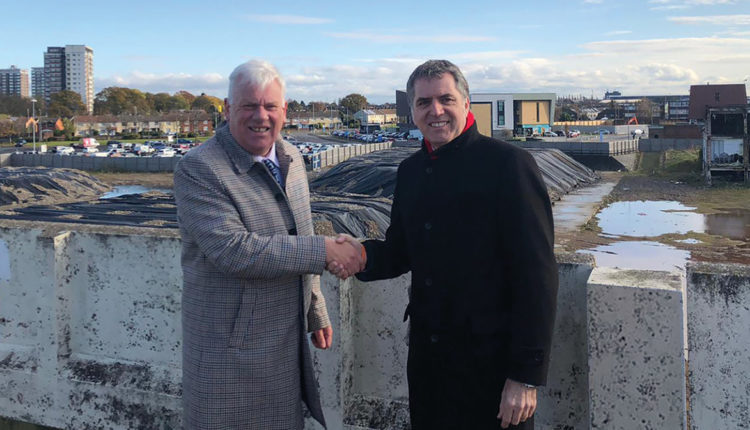Last year Metro Mayor Steve Rotheram established the Liverpool Town Centres Commission to look at securing the future of town centres in Liverpool city region. Tony McDonough reports

A series of measures to revitalise local town centres in the Liverpool city region that have been battered by the effects the COVID-19 pandemic are published today.
They include investment into sustainable capital projects in local communities and encouraging local entrepreneurs to start up creative and cultural businesses using small-scale grants and loans. It also said local people needed to have a stake in the ownership of assets and land
In an interview with LBN in January, the former estates director at Liverpool ONE and now co-founder of consultancy The Momentum Group, Chris Bliss, said he expected city centres to recover and thrive post-COVID but feared for the future of high streets in smaller towns.
In January 2020, Liverpool City Region Metro Mayor Steve Rotheram established the Liverpool Town Centres Commission. It’s brief was to devise a blueprint for the future of neighbourhood centres in the city region. The impact of COVID-19 on smaller high street businesses has given garter urgency to the task.
The 11 members of the commission, who represented business, academia and the public sector, undertook research which focused on town centres in Widnes, Runcorn, Halton Lea, Huyton, Kirkby, Prescot, Southport, Bootle, St Helens, Earlstown, Birkenhead, Liscard (Wallasey), Heswall, Moreton, New Brighton and West Kirby, as well as Liverpool city centre.
It met six times during 2020 and now it has have set out their recommendations to policymakers, which could ensure that town centres retain a vital role at the heart of their communities.
READ MORE: Metro Mayor pledges extra £2.8m for Kirkby town centre
In their report they speak of the need for town centres that are “attractive, inviting and accessible for a diverse community” with clean, safe streets and spaces, a range of shops and services that meet local needs, and opportunities to take part in events and activities.
They also said that people in the community needed to take a central role in the decision-making process and have a stake in the ownership of assets and land. Transport connectivity was also identified as critical to the overall plan. The specific recommendations included:
- Revenue investment that maximises the value of capital projects, to sustain them over time and let them develop and adapt to changing circumstances.
- Encouragement and opportunities for creative and cultural businesses, social enterprise and diverse entrepreneurship, including small scale grants and loans.
- Innovation in funding, ownership, design and the use of space such as encouraging pop-up spaces for community activity, local businesses or public service delivery; and ensuring vacant land is well managed and activated to contribute positively to town centres until its future use is decided.
- Policymaking that puts people first in town centres – for example making health and wellbeing a key aim of policy, helping people to build skills for jobs in their local area, and giving local people more control over their town centre’s future through co-operative planning.
Chief executive of Make CIC, and member of the commission, Liam Kelly said: “Before the pandemic town centres were already failing to keep up with the pace of change in our economy.
“There has been an over-focus on consumption and an under-focus on production and services. Alongside this they face an ownership crisis with increasing landlord rent expectations and a seemingly inevitable rise in property value pricing out the doers. These factors have caused inertia at a time when we need energy.

“Unexpectedly the pandemic has given some town centres a new sense of purpose, with many people forced to shop local for the first time in years. People have a growing desire to support local business and are asking questions about how ethical and environmental their spending is.
“The renaissance of our region’s town’s hangs in the balance. They can be a good news story post-pandemic. But this requires us to rethink and reprioritise. Critically, those in power must focus less on the fabric of our towns (buildings) and more on the life blood (people).”
Welcoming the report, Mr Rotheram pledged to put the recommendations into practice. He added: “Town centres and high streets are at the heart of our communities, providing a hub for people to meet, shop and socialise but sadly too many have seen better days. In the aftermath of the last General Election, there was lots of attention lavished on towns, but we’ve not seen enough action from Government to follow it up.
“When I launched this commission, I said that our economy, both regionally and nationally, would not thrive unless success was shared between our cities and our towns. Locally we’ve been investing in both the present and future of town centres.
“We’ve put tens of millions of pounds into town centres across the region from New Ferry and Bootle, to Kirkby and Southport. I launched a multi-million-pound town centre fund to help empower local councils to build the capacity to develop ambitious plans to invest in the regeneration of their high streets.
“Despite the challenges of this pandemic, I want to safeguard the future of our town centres to ensure that they remain at the heart of our communities for generations to come.”

